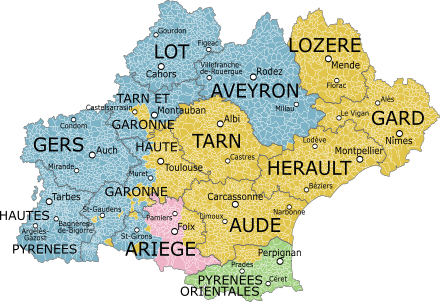Occitanie
| Occitanie | ||
|---|---|---|
| Region of France | ||
| ||
 | ||
| Country |
| |
| Prefecture | Toulouse | |
| Departments |
13
| |
| Government | ||
| • President | Carole Delga (Socialist Party) | |
| Area | ||
| • Total | 72,724 km2 (28,079 sq mi) | |
| Population (2012) | ||
| • Total | 5,626,858 | |
| • Density | 77/km2 (200/sq mi) | |
| Time zone | CET (UTC+1) | |
| • Summer (DST) | CEST (UTC+2) | |
Occitanie (French: [ɔksitani]; Occitan: Occitània, Catalan: Occitània) is an administrative region of France that was created on 1 January 2016 from former French regions Languedoc-Roussillon and Midi-Pyrénées. France's Conseil d'État approved Occitanie as the new name of the region on 28 September 2016, effective 30 September 2016.[1]
The modern administrative region is named after the cultural and historical region of Occitania, which covers a larger area.
The new region covers an area of more than 72,724 km2 (28,079 sq mi) with a population of 5,626,858.[2]
Toponymy
As the provisional name of the new region, the text of the law specified the hyphenated names of the region's predecessors, Languedoc-Roussillon and Midi-Pyrénées, in alphabetical order. As for most of the merged regions, a permanent name was proposed by the new regional council;.[3][4][5] The new name, Occitanie, comes from the historical name of the broader region, which refers to the historic use of the Occitan language and its various dialects in the region, named for the use of the word òc as the equivalent of "yes."
Enacted in 2014, the territorial reform of the regions has been subject to debate for many years.[6] On 24 June 2016, the regional assembly of Languedoc-Roussillon-Midi-Pyrénées adopted Occitanie after a lengthy public consultation, which corresponds to the name of the linguistic region that included most of the new region's territory.[7] The provisional name of the region was withdrawn on 30 September 2016, when the new name of the region took effect.[1]

Major communities
- Toulouse (466,297; region prefecture)
- Montpellier (272,084)
- Nîmes (150,564)
- Perpignan (120,959)
- Béziers (74,811)
- Montauban (57,921)
See also
References
- 1 2 Décret n° 2016-1264 du 28 septembre 2016 portant fixation du nom et du chef-lieu de la région Occitanie (in French)
- ↑ "Populations légales 2012 des régions". Insee. Retrieved 16 January 2015.
- ↑ "Nom Région LRMP : Quelques jours pour Se mobiliser, des décennies pour durer". Le Blog De L’occitan / Lo Blòg Occitan. France 3. 2016-05-14. Retrieved 2016-08-10.
- ↑ "Nom Région LRMP : Occitanie c’est validé, Carole Delga s’occupe des Catalans". Le Blog Politique. France 3. 2016-06-17. Retrieved 2016-08-10.
- ↑ Loi n° 2015-29 du 16 janvier 2015 Relative à la délimitation des régions, aux élections régionales et départementales et modifiant le calendrier électoral (in (in French))
- ↑ "Résultats élections Régionales 2015". Le Monde (in French). Agence France-Presse. 14 December 2015. Retrieved 14 December 2015.
- ↑ "Le nom de ma région : Occitanie - La nouvelle Région - Région Occitanie / Pyrénées-Méditerranée". Regionlrmp.fr. Retrieved 2016-08-10.
